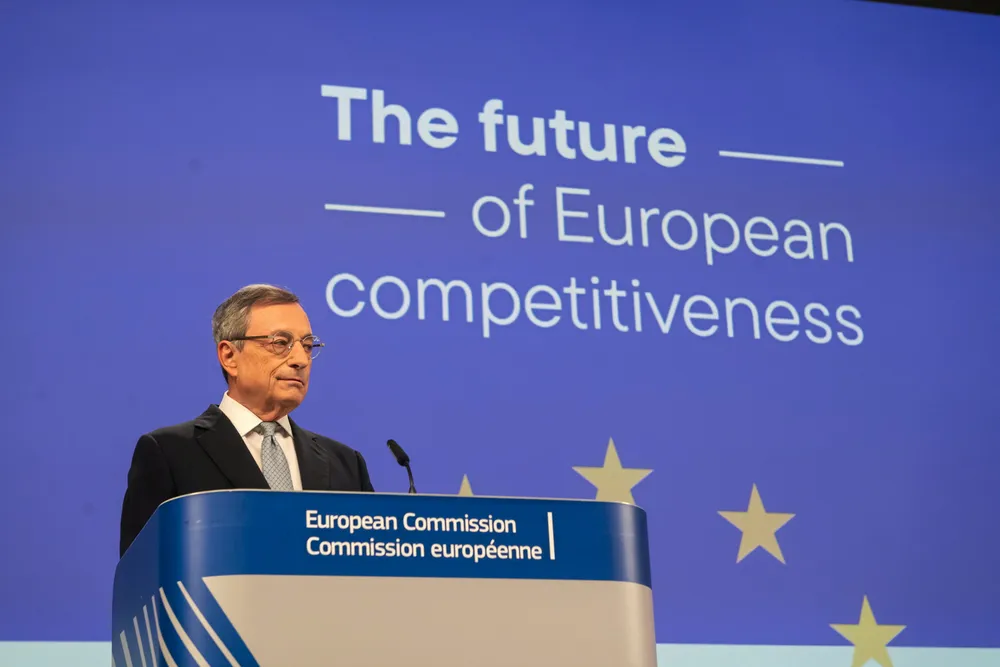Draghi 'hits bull's eye' on EU competitiveness says wind industry group
Renewables and power industry groups welcome emphasis on clean tech, decarbonisation and electrification to boost Europe’s growth

The report by former European Central Bank President and Italian Prime Minister Mario Draghi on the future of European competitiveness “hits the bull’s eye” on a series of measures impacting the renewables sector, with implementation now key, wind and solar associations said.
Draghi in his report pointed to a gap in GDP and productivity growth between the EU and the US in the past two decades, as well as Europe falling behind in digitalisation and artificial intelligence while generally lacking dynamism and innovation.
But the report also stressed that Europe still has an edge in clean technologies and identified decarbonisation as one out of three areas for action that have the potential to reignite economic growth.
“The EU is a world leader in clean technologies like wind turbines, electrolysers and low-carbon fuels, and more than one-fifth of clean and sustainable technologies worldwide are developed here,” the report said.
Chinese threat
“Yet it is not guaranteed that Europe will seize this opportunity. Chinese competition is becoming acute in industries like clean tech and electric vehicles, driven by a powerful combination of massive industrial policy and subsidises, rapid innovation, control of raw materials and ability to produce at continent-wide scale.
“The EU faces a possible trade-off. Increasing reliance on China may offer the cheapest and most efficient route to meeting our decarbonisation targets. But China’s state-sponsored competition also represents a threat to our productive clean tech and automotive industries.”
For the cleantech sector to become a source of growth, the EU will need a joint plan spanning industries that produce energy and those that enable decarbonisation such as clean tech and automotives, the report added.
“The Draghi report hits the bull's eye on so many things. Decarbonisation and competitiveness go hand-in-hand,” WindEurope CEO Giles Dickson said.
The report is set to play a significant role in the shaping of the new European Commission's strategic direction, SolarPower Europe reckoned in a statement on Draghi’s recommendations.
“It’s good news for solar and renewables that today’s report recognises the importance of decarbonisation and competitiveness, and underlines how mutually reinforcing they are,” SolarPower Europe CEO Walburga Hemetsberger said.
“The best option for EU competitiveness remains flexible, renewable-based electrification. As we’ve modelled, flexible electrification, based on renewables, can decrease day-ahead electricity prices by 25% by 2030 and 33% by 2040 – that’s a no-regret pathway for Europe.”
“The solar sector is relieved to read the acknowledgment of the critical role of long-term contracts, like PPAs and CfDs, as well as marginal pricing, in making the electricity system work and delivering lower energy prices for industry.”
But von der Leyen when shaping her “new College of Commissioners” should strive for lowering the costs of electrification, she said, adding that the EU should adopt Electrification Action Plan as a pathway to electrify industry and buildings as well as transport.
On that point, Eurelectric’s Secretary General Kristian Ruby added: “It is positive to see that the need for reinforced and expanded power infrastructure is now front and centre, together with the development of storage and flexibility solutions.
“Draghi’s report highlights the importance of long-term instruments such as PPAs and CfDs to help better transfer the benefits of cheap renewable and clean energy to consumers and to make our energy prices more competitive.
“To see PPAs volumes rise to the necessary levels, however, all EU member states must urgently implement the agreed electricity market reform.”
(Copyright)